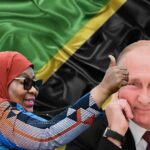Russian President Vladimir Putin has formally withdrawn the country from the Multilateral Nuclear Environmental Program (MNEPR), a long-standing international agreement focused on nuclear safety and environmental protection.
The decision marks another step in Russia’s retreat from global arms control and environmental frameworks amid rising geopolitical tensions.
The MNEPR, established in 2003, was a cooperative effort involving Russia, European nations, the European Union, and organizations like the European Bank for Reconstruction and Development. Its mission was to address the safe handling of nuclear waste and spent fuel, particularly those inherited from the Soviet Union’s nuclear legacy.
Russia’s departure from the program signals a potential halt to collaborative projects aimed at mitigating the environmental risks associated with nuclear materials. Analysts warn this move could exacerbate global challenges related to nuclear safety.
The Kremlin has not provided detailed reasons for the withdrawal, but the decision fits a pattern of increasing isolationism in Russia’s recent foreign policy. Earlier this year, Moscow suspended its participation in the New START treaty, the last major arms control agreement between the United States and Russia. The country also revoked its ratification of the Comprehensive Nuclear-Test-Ban Treaty, bringing its stance closer to that of the U.S., which signed but never ratified the agreement.
These developments have sparked concern among international experts, who see a dangerous erosion of decades of nuclear arms control progress. “The withdrawal from these agreements undermines global stability and increases the risk of a renewed arms race,” said a senior European diplomat.
Also Read; Jimmy Carter, Former US President, Dies at 100
The MNEPR played a critical role in enabling international assistance to Russia for cleaning up radioactive contamination and ensuring the safe disposal of nuclear materials. Its dissolution leaves uncertainty about the fate of ongoing and future projects critical to environmental and public health.
Western nations, including European Union member states, have called on Russia to reconsider its decision, emphasizing the importance of sustained cooperation on nuclear safety. However, Moscow’s recent actions suggest a shift towards asserting greater control over its nuclear policies and reducing reliance on external assistance.
This latest move underscores the growing divide between Russia and the West, with experts warning of long-term consequences. “This is not just about one agreement; it’s about dismantling trust and cooperative frameworks built over decades,” said a nuclear policy analyst.
Observers say re-establishing communication channels and addressing underlying security concerns will be crucial to preventing further escalations and safeguarding both global security and environmental integrity.







